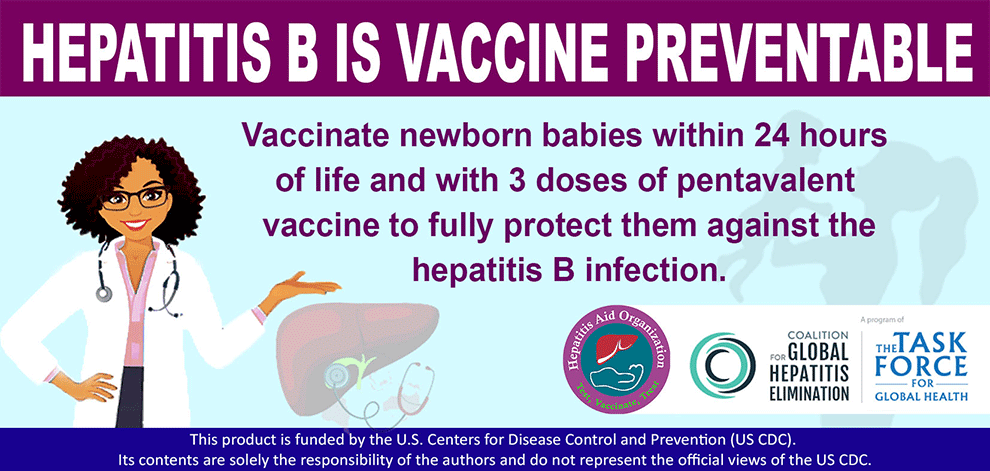Partnering to Increase Hepatitis B Birth Dose Vaccination in Africa
April 5, 2023
Updated April 5, 2023
In 2022, CDC partnered with the Coalition for Global Hepatitis Elimination at The Task Force for Global Health and civil society organizations in Africa to encourage hepatitis B vaccination at birth.
Of the 6 million children under the age of five years old living with hepatitis B, 4 million are in Sub-Saharan Africa. Women who are living with hepatitis B can transmit the virus to their newborns during birth, known as mother-to-child transmission.
Mother-to-child-transmission is the primary source of chronic hepatitis B virus infection. Nearly all babies who become infected at birth will develop chronic hepatitis B, and 25% of them will develop liver cancer. A timely hepatitis B birth dose vaccine, given within the first 24 hours of life, can prevent mother-to-child transmission.
Of the 47 countries in the World Health Organization African Region, only 15 provide hepatitis B birth dose vaccination as part of their routine immunization programs, leaving almost 28 million newborns in sub-Saharan Africa without protection from the hepatitis B virus.
Hepatitis B is a liver infection caused by the hepatitis B virus. Hepatitis is mostly a “silent” disease, as the majority of people with hepatitis B do not show symptoms for years, leading to cirrhosis, liver failure, liver cancer and premature death. The younger the age of infection with hepatitis B virus, the greater the risk of lifelong or chronic disease.
Although a safe and effective hepatitis B vaccine has been available for more than 30 years, hepatitis B virus infection remains a significant cause of disease and death globally. More than 296 million people around the world are living with hepatitis B, which leads to 820,000 deaths every year.
Leveraging Trusted Messengers to Promote Hepatitis B Birth Doses
To address this inequity and educate mothers and health workers on the importance and benefits of hepatitis B birth dose vaccination, CDC partnered with the Coalition for Global Hepatitis Elimination (CGHE), a program of The Task Force for Global Health.
CGHE, in turn, partnered with local civil society organizations that represent the interests of mothers, health workers, and people living with viral hepatitis in Africa. Local partnerships are vital to creating a community of advocates to encourage essential vaccines like hepatitis B. Participants included:
- The Hepatitis Aid Organization in Uganda
- The Hepatitis Alliance of Ghana
- Care for Social Welfare International in Cameroon
- Health and Rights Education Programme in Malawi
- Foundation for Liver and Gastrointestinal Research
During the summer of 2022, these organizations launched campaigns to promote hepatitis B birth dose vaccine. CGHE and CDC provided training on general communication best practices, provided technical expertise, and collaborated on materials produced. As civil society organizations know their communities best, they tailored their communications for specific audiences using local languages and following cultural norms.
Their primary message – that a hepatitis B birth dose vaccine is an essential vaccine that will save lives – appeared in posters, stickers and brochures distributed during health awareness campaigns, radio shows, news stories shared with media outlets, social media campaigns, and policy briefs. Some materials were widely distributed, including all healthcare facilities, local markets, and community centers.

Sticker created by The Hepatitis Aid Organization in Uganda.
One of the most impactful, creative, and widely distributed program components was a jingle (song) created by Care for Social Welfare International in Cameroon that shared the importance of birth dose vaccination. The radio jingles aired during prime time before main news broadcasts on four national radio stations and on six regional radio stations. It was also played during a large regional conference and in webinars.
The four jingles that aired on Cameroon Radio Television (CRTV) had a national audience of more than 200,000 with a second airing that reached approximately 10,000 people through regional radio channels in surrounding communities.
In Uganda, highlights included a catchy jingle with rhyming lyrics that clearly communicated the benefits of the hepatitis B birth dose vaccine. Materials such as stickers, social media campaigns, and radio spots were created in local languages. Community workshops with healthcare workers and key stakeholders reiterated the importance of the hepatitis B birth dose vaccine, and a workshop educated journalists and other representatives of local media on the significance of introducing the vaccine.
Lasting Impacts of Partnerships
Strong partnerships and the use of creative communication and education materials can have lasting impact. In countries with limited resources and competing health threats, these types of collaborations can provide trusted, credible information to communities that need them most. They also help produce a community of advocates that can continue to encourage vital health services like immunizations long after the campaigns end.
The Ministry of Health in Uganda introduced the hepatitis B birth dose vaccine into its immunization schedule in 2023. Infants in Uganda will have a better chance at a longer, healthier life.
Learn more about CDC’s work on hepatitis B vaccines globally.